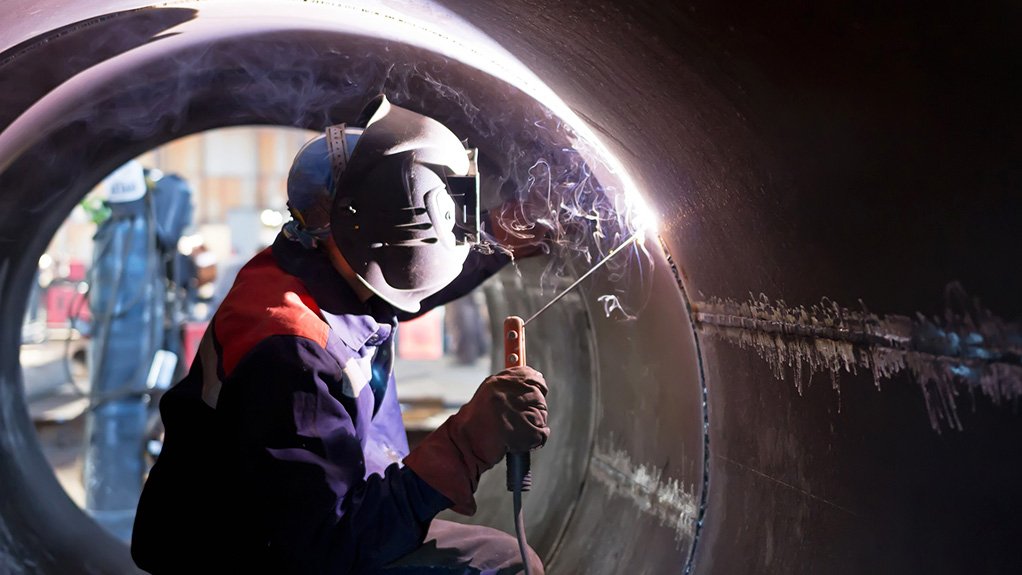The Southern African Institute of Welding (SAIW) is championing work-based apprenticeship learning for the welding industry through the SAIW Foundation, and the Quality Council for Trade and Occupation (QCTO).
This comes after the noticeable lack of apprenticeship opportunities, which is regarded as one of the main obstacles facing artisan learners in South Africa.
The difficulty is that, while such learners may achieve a suitable qualification at a technical and vocational education and training college, they subsequently discover that they cannot obtain the necessary work experience required for a position.
The learning programme championed by SAIW provides aligned, professional training and service standards to support the overall economic growth of the industry through skills delivery and international standard qualifications.
SAIW business development manager Etienne Nell states that welding industry apprenticeship training has been plagued with profit-only-focused training centres and outdated curriculums, as well as poor skills standards and workplace service delivery.
“Many welding apprentices were, therefore, failing to secure work, and employment opportunities were lost, owing to non-aligned skills training or occupational competency.”
Through the new integrated learning programme, all traineeships will be facilitated according to the QCTO curriculum and based on targeted skills training standards at the SAIW.
As such, the new dual system learning apprenticeships will combine industry- designed curricula, as well as technical and simulated practical training at the SAIW academy, in Johannesburg, Gauteng, which is overseen by qualified and experienced employed welders, with authentic workplace experience.
“This means fabricators select and manage their employees and register them for the desired training standards for the services they require. The employees can then complete their apprenticeship on the job and according to industry requirements of the recognised standards of welding expertise,” he explains.
Integrated Approach
The industry-designed curricula programme will ensure that apprentices attain 1 310 hours of theoretical training, 1 960 hours of simulated welding training and 2 200 hours of workplace experience, resulting in new qualifications that reflect occupational competence, trade theory, simulated practice and workplace capability.
These qualifications will assist apprentices in achieving economic productivity and higher employment returns in their chosen speciality.
The benefits for industry employers include the resulting productive value of the apprentice’s work, Sector Education and Training Authority grant support towards apprentice training costs, a tax-break from the South African Revenue Services and
broad-based black economic empowerment scorecard points for skills development for the welding industry.
Further, showing full commitment to the QCTO curriculum and the new dual system, the institute will also assist in maintaining the required training results for external assessment as required by the QCTO.
Nell explains that collaboration among the SAIW, the QCTO and the International Institute of Welding ensures that the industry is ensured of the best possible outcomes when supporting quality-assured workplace learning to national qualifications.
“They will have skilled employees trained to industry standards and acculturated to the company, meaning there is lower risk to quality and service, lower-cost recruitment and better employee retention,” he enthuses.
Employer Support
In support of the dual system nationally and internationally recognised diploma, the SAIW is calling on the welding industry to show its support by providing apprentice contracts for employees and agreeing to a memorandum of understanding with the SAIW concerning quality assurance.
SAIW executive director John Tarboton describes it as a win-win situation that will benefit the industry economically, as “it could not have come at a better time, given the current economic crisis that the country finds itself in”.
However, he stresses that the institute cannot achieve this alone.
“We need industry commitment and financial support to drive this programme. This makes perfect business sense, given that it will ultimately lead to the delivery of highly skilled welding artisans of an international standard and an overall deepening of South Africa’s skills base,” he concludes.
Edited by: Zandile Mavuso
Creamer Media Senior Deputy Editor: Features
EMAIL THIS ARTICLE SAVE THIS ARTICLE
ARTICLE ENQUIRY
To subscribe email subscriptions@creamermedia.co.za or click here
To advertise email advertising@creamermedia.co.za or click here













